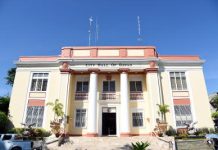System seen fit for islands like Boracay
DAVAO CITY—The mayor of the country’s oldest mining community believed his town has hit upon a “low-cost but highly-effective’ indigenous system of processing solid wastes without having to appropriate millions in taxpayers’ money.
In Davao City during the holidays, Mankayan, Benguet mayor Atty. Materno Luspian said the system is appropriate to mountainous terrains or high-risk areas deprived of wide open spaces.
He said it could also fit exactly in island settings like Boracay or the Island Garden City of Samal (Igacos).
Located 80 kilometers north of Baguio City, the first-class town of Mankayan is host to the Lepanto Mining and several mining companies.
The mayor said the indigenous technology revolves around several rows of crib-like formation of bamboo slats where the town’s biodegradable wastes are deposited.
Luspian said the system required only “a few thousand pesos to put up and to maintain.” In contrast, an ESL costs an average of P50 million upwards, according to the Department of Environment and Natural Resources (DENR).
Laboratory analysis conducted by the Saint Louis University showed the high-grade compost produced by the crib showed no lead or toxic residues.
Fred Fangonon, a former OFW who introduced the system, said this down-to-earth composting technology can process all biodegradables, from market wastes to baby diapers and turn them into high-grace compost.
The system requires no shredding, enzymes or turning over.
“And since it can compost big volume, it can help mitigate climate change because it produces no methane or leachate or foul smell,” he said.
He said the system relies chiefly on indigenous organisms (to include flies, maggots and earthworms) that work harmoniously in breaking down the wastes and turning them into compost.
Nature has provided macro and micro organisms for the composting process. When these organisms finish their task, the compost is clean and ready for growing plants,” Fangonon said.
“I was pessimistic at first but the results will speak for itself,” said Lupian, who went on to defend the system before the environmental management bureau of the DENR.
He told the DENR the system is appropriate in mountainous terrain, Baguio City including, because of lack of wide open spaces in putting up engineered sanitary landfills (ESLs).
Luspian said the crib is an appropriate alternative for low-income local government units that can ill-afford the establishment of ESLs.
Early last year, the Ombudsman has suspended nine Philippine mayors and 19 other government officials for violations in the implementation of Republic Act 9003 that penalized the operation of open dumps.
But in September 2018, the Ombudsman recalled the orders to pave the way for a review of the cases.
Martirez told reporters there was need to revisit the law on solid waste ‘since it is not economically feasible for third and fourth-class municipalities.”
Luspian said the said crib avoids the pitfalls associated to an open dump and provides communities an environment-friendly system of treating biodegradables. (JKL)






